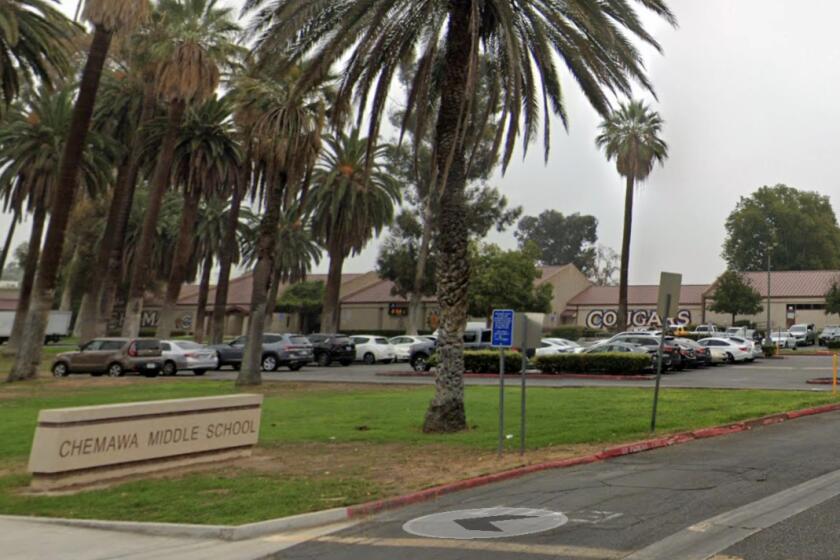Parents, educators split on what to do with No Child Left Behind
Despite many criticisms, parents and educators would rather mend than end the federal No Child Left Behind law, which requires all children to be academically “proficient” by 2014. The public at large also expressed interest in national education standards, according to a survey released Tuesday.
New Jersey-based Educational Testing Service, which commissioned the poll of parents, teachers, administrators and others, found that many surveyed knew few details about No Child Left Behind or harbored misconceptions. Public support rises when the law is explained, concluded pollsters Peter D. Hart, a Democrat, and David Winston, a Republican.
Most teachers (77%) and administrators (63%) hold a “staunchly negative” view of the law, though only a small percentage would dump it, results show.
Critics questioned the survey’s description of the law: “The No Child Left Behind Act provides federal funds for school districts with poor children in order to close achievement gaps. It also requires states to set standards for education and to test students each year to determine whether the standards are being met by all students. In addition, No Child Left Behind provides funding to help teachers become highly qualified. It also provides additional funding and prescribes consequences to schools that fail to achieve academic targets set by their state.”
This wording overlooks the negative ramifications of an underfunded “lock-step focus on a test-and-punish regime,” said Robert Schaeffer, public education director of the Massachusetts-based FairTest coalition, which advocates sweeping changes. “There is not a single credible education measurement expert in the country who believes the 2014 deadline for all children being proficient is realistic,” he added.
L.A. parent activist Martha Sanchez, who wasn’t polled, shares the confusion of many respondents. She said she’s unclear about who’s responsible for the all-too-limited progress at her children’s schools.
“To me, this law is more about politics than helping children. We’re not receiving more support for teachers and parents.”
The bipartisan 2002 law, a major initiative of the Bush administration, is up for reauthorization before Congress.
All groups surveyed agreed that lack of parental involvement and classroom discipline are two main problems in failing schools. They also agreed that those schools needed more funding to hire teachers and reduce class size and that administrators should be required to develop a real “change of plan.”
The idea of replacing “many teachers,” by contrast, drew only a 12% endorsement from the general public, below “do nothing” (18%).
Groups were split on replacing state-by-state academic standards with national ones. Most of the general public favors it (59%). Most teachers (43% support) and administrators (41%) do not.
Educational Testing Service designs the nationwide test that samples achievement in some grades and subjects.
The majority of Latinos (55%) said the test scores of English learners should count immediately. Most teachers (77%) and administrators (85%) said the scores should be excluded for two or three years while those students improve their English.
The views of Latinos are an understandable reflection of that community’s desire not to be overlooked in the push to improve schools, said state Supt. of Public Instruction Jack O’Connell. California excludes scores of English learners for one year. Latinos make up 72.8% of students in the Los Angeles Unified School District and 48% of students in California.
Taking part in the national survey, conducted May 4-15, were 1,000 members of the public, 626 parents of students from kindergarten through 12th grade, 251 teachers and 101 school administrators.
For details, go to www.ets.org/americansspeak.html
--
(BEGIN TEXT OF INFOBOX)
Difference of opinion
Parents and the public support the federal No Child Left Behind law more than educators. The law is up for reauthorization before Congress.
The No Child Left Behind law should be reauthorized with . . .
General public
. . . minor changes: 41%
. . . major changes: 35%
It should not be reauthorized: 16%
--
Parents of K-12 students
. . . minor changes: 45%
. . . major changes: 36%
It should not be reauthorized: 13%
--
Public school teachers
. . . minor changes: 17%
. . . major changes: 58%
It should not be reauthorized: 25%
--
Public school administrators
. . . minor changes: 26%
. . . major changes: 52%
It should not be reauthorized: 22%
--
Note: Some percentages do not total 100%.
Source: Educational Testing Service
--
Los Angeles Times




